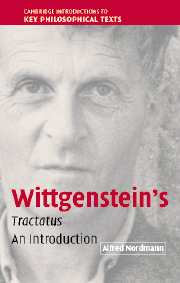Book contents
- Frontmatter
- Contents
- Preface
- List of abbreviations of works by Wittgenstein
- Introduction: Wittgenstein's provocation
- 1 Critical philosophy
- 2 The argument
- 3 Thought experiments
- 4 Tense and mood
- 5 The senses of sense
- Conclusion: a sense of familiarity
- References
- Index of names and subjects
- Index of passages
2 - The argument
Published online by Cambridge University Press: 03 February 2010
- Frontmatter
- Contents
- Preface
- List of abbreviations of works by Wittgenstein
- Introduction: Wittgenstein's provocation
- 1 Critical philosophy
- 2 The argument
- 3 Thought experiments
- 4 Tense and mood
- 5 The senses of sense
- Conclusion: a sense of familiarity
- References
- Index of names and subjects
- Index of passages
Summary
We have now seen why one might want to declare nonsensical all sentences except for the propositions of logic and science and our ordinary descriptions of the world. Within the critical tradition this amounts to a perfectly sensible determination of the limits of language and knowledge. What we have not seen as yet is why we should draw those limits where Wittgenstein draws them.
The previous chapter presented an assortment of sometimes compelling philosophical convictions, it suggested motivations and showed how the views of Kant, Lichtenberg, Hertz, and Wittgenstein reenforce each other, but it did not give us more than hints of how to defend their critical conclusions. We might agree, for example, that it is better to dismiss certain questions as nonsensical rather than to remain haunted forever by the inadequacy of all proposed answers. But do we really have a credible account of the agreement between representations and reality, and does it really make us see how all metaphysical matters are evidently nonsensical?
We must therefore begin to investigate how Wittgenstein makes his case in the Tractatus, how he establishes his conclusions about sense and nonsense, and then, of course, whether his argument is invalidated because, on his own terms, he writes philosophy in the nonsensical language of unphilosophy.
STRICTLY PHILOSOPHICAL AND SIMULTANEOUSLY LITERARY
In two famous letters to a prospective publisher of the Tractatus, Wittgenstein provides a few hints to the novice reader of his book.
- Type
- Chapter
- Information
- Wittgenstein's TractatusAn Introduction, pp. 47 - 91Publisher: Cambridge University PressPrint publication year: 2005

